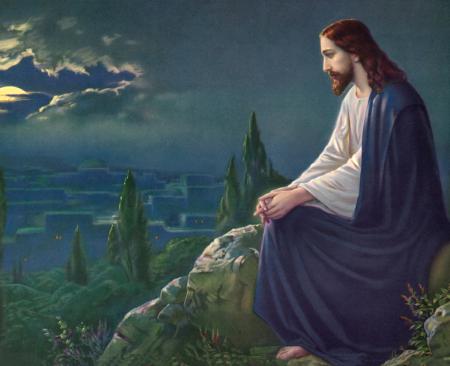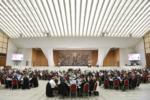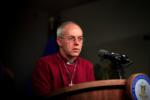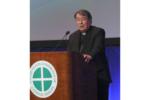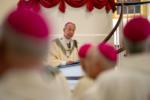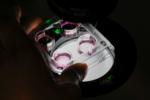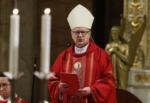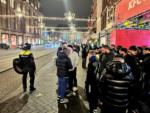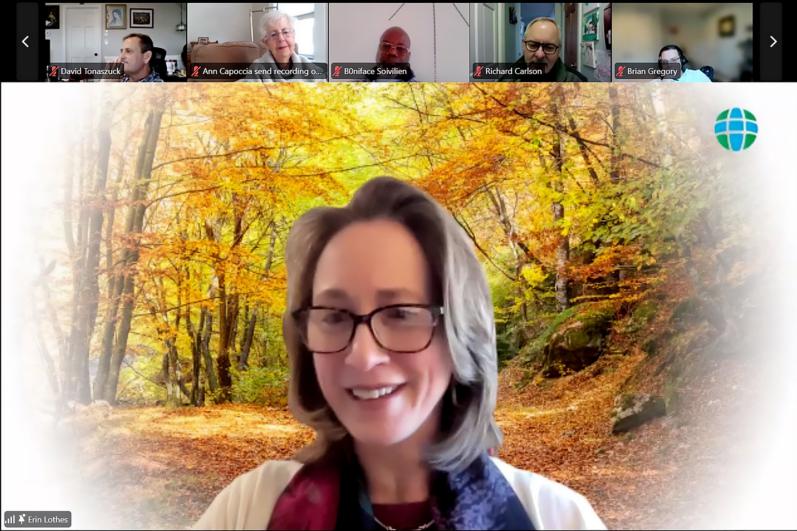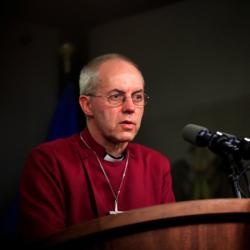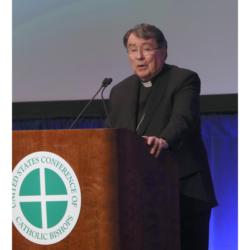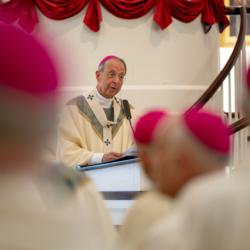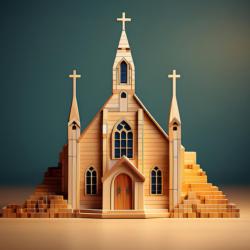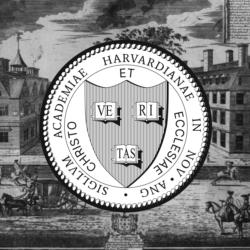Social Justice Convocation explores implications of 'Laudato Si''
BRAINTREE -- Shortly before the Archdiocese of Boston's 16th annual Social Justice Convocation, "Hope for Our Common Home: Catholics Care for Creation," Bishop Mark O'Connell saw a video on Instagram of a comedian talking about the importance of fighting climate change. The comedian joked that he is doing his part by collecting cans to recycle.
"We have to change from collecting cans, which I know some of you are dedicated to, but we have to get the world to change their minds from that little collecting of cans or whatever," Bishop O'Connell said in his remarks at the convocation, which was held virtually on Oct. 26 and attended by over 100 people. "It's not enough. When I grew up, caring for creation was making sure I didn't litter. Today, I realize it means so much more."
The convocation was hosted by the Archdiocese of Boston Social Justice Ministry and the Boston Catholic Climate Movement. It centered around the teachings of Pope Francis's 2015 encyclical "Laudato Si'" (Latin for "Praise Be to You"), in which he outlines the moral and environmental crisis caused by climate change and overconsumption of natural resources and how the church is called to respond.
Bishop O'Connell read excerpts from the encyclical, in which Pope Francis uses Scripture and church tradition to decry humanity's plundering of Earth's resources. Pope Francis wrote that the Book of Genesis has been misinterpreted to mean that human beings have absolute dominion over creation, when really, Scripture teaches that humanity is responsible to care for creation.
"Each of us has a role," Bishop O'Connell said. "I don't know what your role is. I pray that we can come together in parishes, small communities or school groups to do something to begin, and as we do, leave room in our hearts for the Holy Spirit to inspire us."
The convocation's two keynote speakers were Dr. Erin Lothes, a theologian, author, and environmental advocate; and Christina Bagaglio Slentz, associate director of Creation Care Ministry for the Diocese of San Diego.
"Our two speakers here are prophets of this mission of caring for creation," Bishop O'Connell said.
In her remarks, Lothes expanded on Pope Francis's analysis of how climate change contributes to global inequality, with pollution and extreme heat affecting the poorest and most vulnerable people in society. In "Laudato Si'," Pope Francis writes that the world's wealthy countries, being the largest polluters, have an "ecological debt" to poorer ones who suffer the most from climate change.
"It's a fascinating category of moral theology," Lothes said, "calling us to recognize the impact that historical consumption has had on those least able to adapt and recover from these impacts. And the impacts are also deadly for individuals."
She said that there are an estimated 200 "environmental martyrs" each year, citing the example of Sister Dorothy Stang, an American Sister of Notre Dame de Namur who was murdered in Brazil in 2005 for her efforts to protect the Amazon rainforest from deforestation. However, since many "environmental martyrs" are poor and indigenous, they go unrecognized.
"So, what does Pope Francis say about that?" Lothes said. "He responds with a theological protest and a loving vision that our residence on this beautiful world God gives us should be so much more than exploitation and suffering."
She said that "Laudato Si'" exhorts Catholics to see the inherent dignity in every person, as well as the dignity in all of God's creation.
"This is not simply an ecological problem of the forests and the seas," she said. "It is interwoven with social injustice, with poverty, with exploitation, and with economic systems that exclude the poor, as he has written before, that profit from a globalization of indifference."
Pope Francis also takes aim at today's culture of "technocracy," saying that human technological advancements should take ethical and moral considerations into account.
"The pope repeatedly writes (that) everything is interconnected," Lothes said. "And this goes back to the teaching of Genesis, that all life is interrelated and grounded in three relationships: with God, with our neighbor, and with the Earth itself. Yet what Genesis goes on to teach is that these relationships have been ruptured. The harmony between the Creator, humanity, and creation as a whole was disrupted by our failure to honor our creaturely limitations."
She said that this message needs to be present in every parish, or nothing will change.
"How often have you heard a homily about care of creation?" she asked. "And this is really very, very important, because Catholics take their moral guidance from their pastor, from the homilies that they hear."
However, she noted that there are challenges to bringing the message of "Laudato Si'" to the public, such as lack of knowledge about the science of climate change, political differences, lack of contact with creation, and "willful ignorance."
"This is something we must confront in our examination of conscience, our examination as a church and as a society," she said. "An important and increasing aspect of the knowledge gap is the pain of recognizing the Earth's degradation."
People must become "painfully aware" of climate change, she said, but maintain hope with faith, prayer, and action. Such action is not only individual, but collective. This includes voting based on Catholic teaching about care for creation, and transforming the world's industries, which rely on fossil fuels -- even though those industries have vastly improved our modern world.
"What we need now is a new inventiveness and the ethical awareness that the inventiveness that got us to here now needs to change," she said.
In her remarks, Bagaglio Slentz pointed out that there are 1.39 billion Catholics in the world, and that the church owns 177 million acres of land in total -- an area slightly bigger than Texas. She said that if all Catholics live the values of "Laudato si'," they can make a big impact.
"We live in a globalized world, right?" she said. "We can get what we want from around the planet within about 24 hours. We can get to wherever we want on the planet in about 24 hours. That means that our actions have a global reach and ripple effect. Therefore, taking "Laudato Si'" is showing our love of neighbor at a global scale."
Bagaglio Slentz sees the effects of climate change firsthand. In California, the risk of wildfires and erosion is perennial. She spent most of her life in Norfolk, Virginia, a city threatened by rising sea levels. As flooding takes place, property values decrease, and low-income areas end up being simultaneously the most threatened and least able to respond.
"We may not necessarily think about this being not just about the trees and the plants and the creatures," she said, "but it's also about our structures, and then also the provision of goods and services. How strong is a government in its capacity to help people when they need it?"
She took conference attendees through the Laudato Si' Action Platform website that parishes, hospitals, schools, and universities can use to tackle such issues using the values of Catholic social teaching. The website offers guides, tools, and other materials that are tailored for various Catholic institutions.
"You want to make sure that the goals that we create, we do as a community using a synodal approach," Bagaglio Slentz said, "and that they are realistic and goals that we can actually put into place within your parish."
The website has examples of action plans created by other parishes for use as a reference.
"Every single step of the way, whatever your community comes up with, that is what you should do," Bagaglio Slentz said.
At the convocation's conclusion, Deacon Tim Donohue, co-leader of the Archdiocese of Boston's Social Justice Ministry, said that despite their being "an awful lot to do," Catholics should not be discouraged.
"There's a huge issue that we need to deal with," he said. "But I think all of this starts with a personal conversion, a personal awareness that this is something that we need to be concerned about, and we have very thoughtful people who can help us move forward."
